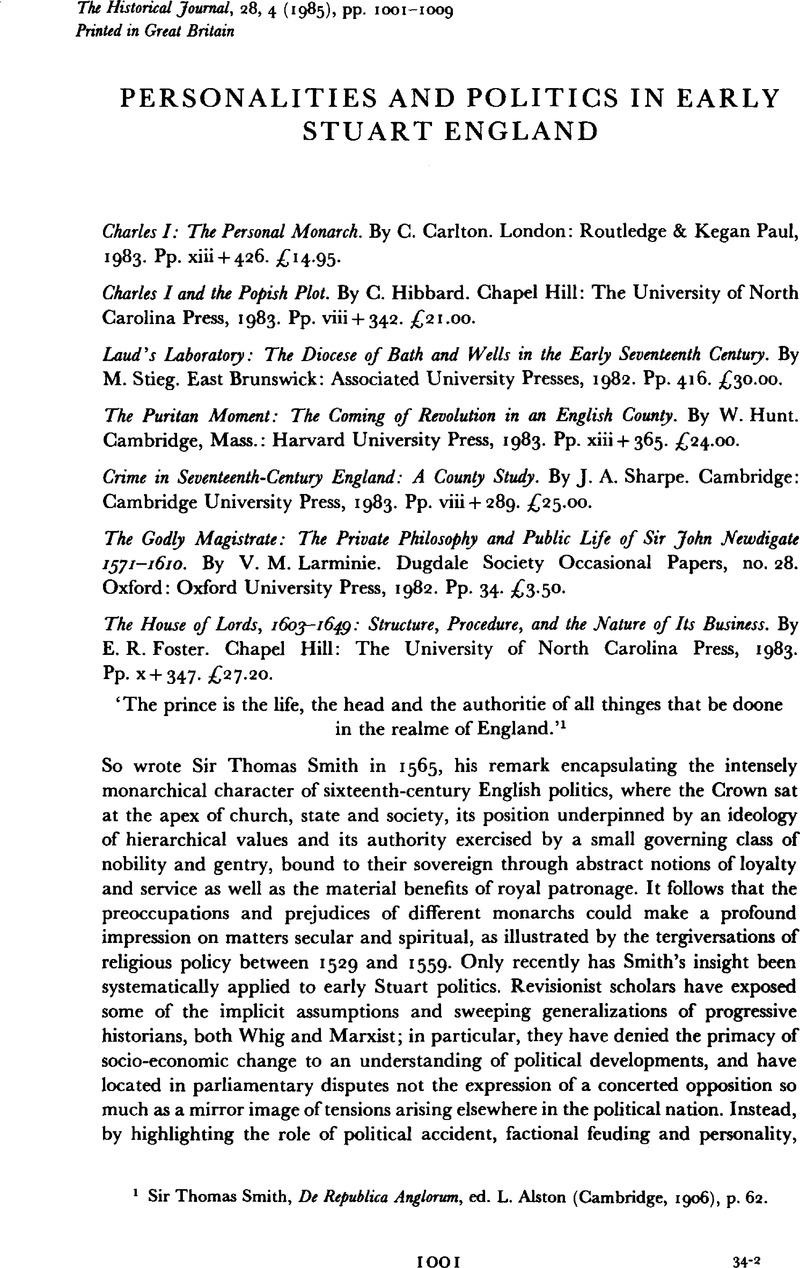No CrossRef data available.
Article contents
Personalities and Politics in Early Stuart England
Published online by Cambridge University Press: 11 February 2009
Abstract

- Type
- Review Articles
- Information
- Copyright
- Copyright © Cambridge University Press 1985
References
1 SirSmith, Thomas, De Republica Anglorum, ed. Alston, L. (Cambridge, 1906), p. 62Google Scholar.
2 Wormald, J., ‘James VI & I: two kings or one?’ History, LXVIII (1983), 187–209CrossRefGoogle Scholar; Fincham, K. and Lake, P., ‘The ecclesiastical policy of James I’, Journal of British Studies, XXIV (1985), 169–207CrossRefGoogle Scholar.
3 Morrill, J., ‘What was the English Revolution?’, History Today, XXXIV (03 1984)Google Scholar; Russell, C., Parliaments and English politics 1621–1629 (Oxford, 1979)CrossRefGoogle Scholar; idem, ‘Why did Charles I fight the Civil War?’, History Today, XXXIV June 1984).
4 Collinson, P., The religion of protestants (Oxford, 1982), p. 90Google Scholar; Ashton, R., The English Civil War: conservatism and reaction 1603–1649 (1983), p. 110Google Scholar.
5 Barnes, T. G., Somerset 1625–1640: a county's government during the ‘Personal Rule’ (Cambridge, Mass., 1961), pp. 303–4CrossRefGoogle Scholar.
6 Bodleian MS Eng. Hist. e. 28, fos. 549–68. Written in an anonymous later seventeenth-century hand, the document is headed ‘The King of Great Britaines Confession of his faith dedicated to all Christian princes and divided:to three and twenty Articles’ and is dated ‘3 Non Jan 1625’. The views it contains could well be those of James I rather than of Charles I.
7 Hyde, Edward, The history of the Rebellion and Civil Wars in England, I (Oxford, 1702), 72Google Scholar; Heylin, Peter, Cyprianus Anglicus (1668), pp. 244, 540Google Scholar; SirDering, Edward, A Collection of Speeches…in matter of Religion (1642), p. 4Google Scholar.
8 Barnes, Somerset 1625–1640; Hembry, P. M., The bishops of Bath & Wells 1540–1640: social and economic problems (1967)Google Scholar; Underdown, D., Somerset in the Civil War and Interregnum (1973)Google Scholar.
9 Barratt, D. M., ‘The condition of the parish clergy between the Reformation and 1660, with special reference to the dioceses of Oxford, Worcester and Gloucester’ (Oxford D.Phil. thesis, 1949)Google Scholar; O'Day, R., The English clergy: the emergence and consolidation of a profession 1558–1642 (Leicester, 1979)Google Scholar.
10 Marchant, R. A., The Church under the law: justice, administration and discipline in the diocese of York 1360–1640 (Cambridge, 1969)Google Scholar.
11 Although no manuscript bibliography is provided, it can be deduced from the footnotes that for the period 1600–26, for example, Stieg has inspected about thirty-five of the seventy extant and undamaged office jurisdiction books.
12 For evidence of Francis James and Arthur Duck presiding regularly in court, see Somerset Record Office (hereafter cited as S.R.O.), D/D/Ca 138, 141, 142, 149, 204, 206, 220, 241.
13 My own calculations are that the failure to catechize was the second most frequent presentment against the Somerset clergy in episcopal visitations between 1600 and 1626.
14 Namely Buckland, Mady, Martin and Sturtevant. Stieg omits the deprivation of Thomas Jones in 1609/10 (S.R.O. D/D/B Reg. 43 fo. 18r); Sturtevant was removed for nonresidence, as is clear from a source that the author herself uses elsewhere (S.R.O. D/D/Ca 134 fos. 43r,144r,174r, 309 V); the charges that led to Mady's ejection can be found in Public Record Office, SP 14/92/38.
15 Peake, T. H., ‘The Somerset clergy and the church courts in the diocese of Bath & Wells, 1625–1642’ (Bristol M.Litt. thesis, 1978)Google Scholar.
16 See, for example, S.R.O. D/D/Ca 232; Hampshire Record Office, Winchester Diocesan Records C 94, 96; West Sussex Record Office, Chichester Diocesan Records Ep. 1/17/22.
17 Cust, R. and Lake, P. G., ‘Sir Richard Grosvenor and the rhetoric of magistracy’, Bulletin of the Institute of Historical Research, LIV (1981), 40–53CrossRefGoogle Scholar.


